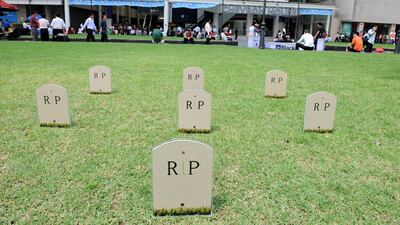Sometimes, life, or in this case, death, steps up and smacks you right in the mouth, and yells: “Hey, there's a message you need to learn here." And you have no choice but to pause and, if you’re lucky, reflect and gain some wisdom.
Thanksgiving, 2018 was one of those days for me. I woke up to a text message telling me that one of my oldest and best friends had died. He was 35. There was no warning.
I met Jay when I was 16. From the first day I met him, I knew I wanted to be friends with him. He was well read and cynical. He had a dark, morbid sense of humour and was deeply insightful about the weaknesses of humanity. And to me, he was always kind. I loved Jay as much as I’ve ever loved anyone.
He wasn’t perfect though. He had his demons, and the darkness that drove his self-destructive habits often drove people away. My biggest regret for him is that this brilliant, insightful person never got to live up to his potential. He dropped out of college after one semester and was, for most of his life, a pizza delivery driver.
When he died, he was living with and taking care of his elderly parents, who were both basically bed-ridden with various health issues. He took care of them when his siblings abandoned them. He had a generous soul.
And at 35, while getting ready for work, he collapsed and died, probably of an aneurysm. Aneurysms can randomly strike anyone at any time. Was it because of his lifestyle? Was it genetic? I don’t think we will ever really know.
__________
Read more:
Can you really afford to buy a car in the UAE?
Choose assets that buy you wealth not poverty
The simple formula that will help you beat lifestyle inflation
__________
To find out about his death on Thanksgiving, a day to feel gratitude for all you have, seemed awful and appropriate at the same time. My life is significantly poorer for Jay’s loss. But it also made me grateful, grateful that I knew him, that I got 19 years of friendship, that who I am is always going to be partly from my friendship with him. Grateful that I am still alive and grateful that I’ve been able to reach out and seize so many of my own dreams, and that I will continue to do so.
It also reinforced the idea that we need to enjoy the journey, because no destination is assured. This, to me, hits at one of the hearts of the conflict many people feel about the financial independence path and journey. Many people feel that they have to deprive themselves of happiness now so that they have enough to enjoy the future once they are FI. They can’t buy the thing now, because they need that money stored up as income-producing assets. In this equation, buying things equals happiness, so if you can’t buy the thing, you’re less happy now, and you've traded that happiness for an uncertain future.
After all, you could die well before you hit FI, then all your “deprivation” would be for nothing. If the value in your life comes from your material possessions, and the experiences you purchase, this is a very real fear and strong reason not to go along with FI.
But to me, the financial independence journey is not about deprivation. It's not about just buying less stuff so that I'm miserable now, only to have a miserly future (and present). I actually think there's a lot of joy in the journey, and if you're going to be successful at pursuing it, you need to find joy in the process, the everyday frugality of it. You need to see and realise value from the path, not the destination.
_________
Read more:
How to live frugally in the UAE and still feel fulfilled
The Happiest Teacher: 'The less you want, the richer you will become'
'Happiest Teacher' blogs about saving money in Dubai
_________
For me, every day that I’m under my spending targets, I get a little boost of joy. My high savings rate gives me so many more options and less stress than if I was living paycheque to paycheque. I am really excited about saving up for a rental property and learning all I can about real estate so that I can be successful in a new area of life.
I love that a life not driven by buying new stuff is far more environmentally sustainable, and probably the only way our planet will remain habitable for human life. I enjoy the extra time I don’t have to spend shopping for new possessions or fixing old ones. I love the lack of attachment I have for material goods that allows me to more easily pack up my life and move to a new country for a new opportunity, as I’ve done six times already.
I love that I don’t need a high salary job, because my needs are low, so I can be a teacher and help kids every day and hopefully make the next generation better than my own. I love the people I've met who are on the FI journey as well, because they're generally fascinating and accomplished and generous. I love that I can help others reach their financial goals because I've educated myself enough that I can bring real value in solving their problems.
All of those are reasons I love the path to FI, and not one of them is really about the goal. I could die today, and not think of my life as a series of wasted purchasing opportunities. I can be proud of how I live.
Dubai school teacher Zach Holz documents his journey towards financial independence on his personal finance blog The Happiest Teacher

